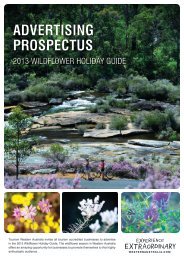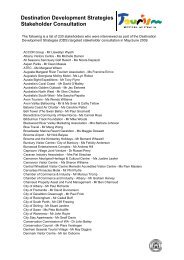A Strategic Approach to the Caravan and Camping Industry 2012
A Strategic Approach to the Caravan and Camping Industry 2012
A Strategic Approach to the Caravan and Camping Industry 2012
Create successful ePaper yourself
Turn your PDF publications into a flip-book with our unique Google optimized e-Paper software.
Regula<strong>to</strong>ry <strong>and</strong> O<strong>the</strong>r Issues<br />
A number of complex regula<strong>to</strong>ry issues concern <strong>the</strong> development (or lack of<br />
development) of <strong>to</strong>urist caravan <strong>and</strong> camping facilities. They include restrictive<br />
planning policy, which prevents development of facilities at locations where<br />
developers are prepared <strong>to</strong> build caravan <strong>and</strong> camping facilities, <strong>and</strong> <strong>the</strong> approvals<br />
process (“red tape”) where multiple agencies are referred, causing untenable delays<br />
<strong>and</strong> adding <strong>to</strong> cost.<br />
The Government of Western Australia has overarching state planning legislation,<br />
which is administered by local government. The Productivity Commission’s recent<br />
study in<strong>to</strong> Planning, Zoning <strong>and</strong> Development Assessment highlighted a number of<br />
differences in state based legislation along with <strong>the</strong> variances in local government<br />
processes for dealing with planning <strong>and</strong> zoning. It also looked at <strong>the</strong> possibility of<br />
benchmarking performances across all local governments.<br />
The Productivity Commission identified that “<strong>the</strong> regulations <strong>and</strong> agencies involved in<br />
planning, zoning <strong>and</strong> development assessments constitute one of <strong>the</strong> most complex<br />
regula<strong>to</strong>ry regimes operating in Australia.” 55<br />
The State Planning Act generally dictates planning requirements as well as <strong>the</strong><br />
planning policies <strong>and</strong> processes <strong>to</strong> be followed by local government <strong>to</strong> process<br />
applications.<br />
So while State government legislation sets <strong>the</strong> broad framework for planning <strong>and</strong><br />
decision-making, local governments carry out <strong>the</strong> day <strong>to</strong> day decision making in<br />
planning.<br />
Local Government has some ability <strong>to</strong> tailor local planning schemes <strong>to</strong> meet specific<br />
local conditions through <strong>the</strong> implementation of local zoning controls. State planning<br />
policy guides planning schemes <strong>and</strong> must be taken in<strong>to</strong> consideration by planning<br />
officers when making decisions.<br />
The priority afforded <strong>to</strong> various pieces of legislation <strong>and</strong> policy st<strong>and</strong>s in <strong>the</strong> way of<br />
inves<strong>to</strong>rs <strong>and</strong> developers being able <strong>to</strong> rely on <strong>the</strong> specific caravan <strong>and</strong> camping<br />
legislation. There are conflicts between <strong>the</strong> <strong>Caravan</strong> Parks <strong>and</strong> <strong>Camping</strong> Grounds Act<br />
1995 <strong>and</strong> planning, conservation <strong>and</strong> building legislation.<br />
Many local government local planning schemes provide barriers <strong>to</strong> <strong>the</strong> development<br />
of caravan parks <strong>and</strong> are a disincentive <strong>to</strong> <strong>the</strong> development of caravan <strong>and</strong> camping<br />
facilities through zoning <strong>and</strong> o<strong>the</strong>r provisions.<br />
A strong message from <strong>the</strong> consultation is that <strong>the</strong> approvals process needs <strong>to</strong> be<br />
simplified, preferably under specific caravan <strong>and</strong> camping development panels, which<br />
would have sufficient powers <strong>to</strong> call state government agencies <strong>to</strong> account <strong>and</strong><br />
overcome <strong>the</strong> delay <strong>and</strong> cost of <strong>the</strong> current approvals system.<br />
Approvals processes are also stifling fur<strong>the</strong>r development of existing facilities.<br />
According <strong>to</strong> Aspen Group, which is stated <strong>to</strong> be <strong>the</strong> largest caravan park<br />
owner/opera<strong>to</strong>r in Australia, <strong>the</strong> barriers <strong>to</strong> new park development <strong>and</strong><br />
redevelopment of <strong>the</strong>ir properties in Western Australia over as long as fifteen years<br />
has caused <strong>the</strong>m <strong>to</strong> shift <strong>the</strong>ir development focus <strong>to</strong> <strong>the</strong> eastern states.<br />
Aspen cites major issues concerning planning approvals, legislation <strong>and</strong> policy <strong>and</strong> also<br />
inaction by government agencies as <strong>the</strong> reason that <strong>the</strong>y have resolved <strong>to</strong> defer<br />
development of caravan parks in Western Australia <strong>and</strong> concentrate on developments<br />
in <strong>the</strong> eastern states.<br />
The lack of available <strong>and</strong> suitable, low cost l<strong>and</strong> for caravan parks results in l<strong>and</strong><br />
speculation. Developers now often consider <strong>the</strong> prospect of l<strong>and</strong> banking in <strong>the</strong><br />
feasibility analysis of caravan park developments on approved l<strong>and</strong>. The issues<br />
associated with inves<strong>to</strong>rs developing caravan parks based on potential future<br />
conversion <strong>to</strong> higher use are:<br />
<br />
<br />
The operational priority is not focussed on service delivery <strong>and</strong>;<br />
The caravan park will be eventually lost <strong>to</strong> alternative use.<br />
Availability of low cost, well located l<strong>and</strong> is <strong>the</strong> key issue for caravan park<br />
development. The return on investment for caravan parks is diminished if suitable<br />
l<strong>and</strong> is quarantined from caravan park development through planning policy.<br />
Often caravan parks are a permitted use only in <strong>to</strong>urist zones, which means that<br />
caravan park developers compete with higher use developers for <strong>the</strong> same scarce<br />
l<strong>and</strong>. Rural, residential <strong>and</strong> industrial or commercial l<strong>and</strong> is often not available <strong>to</strong><br />
caravan park developers despite its acceptability <strong>and</strong> suitability <strong>to</strong> <strong>the</strong> market.<br />
55 CIAWA - <strong>Caravan</strong> Parks Proprie<strong>to</strong>rs Survey, 2011 - Unpublished<br />
A <strong>Strategic</strong> <strong>Approach</strong> <strong>to</strong> <strong>Caravan</strong> <strong>and</strong> <strong>Camping</strong> Tourism in Western Australia Page 48


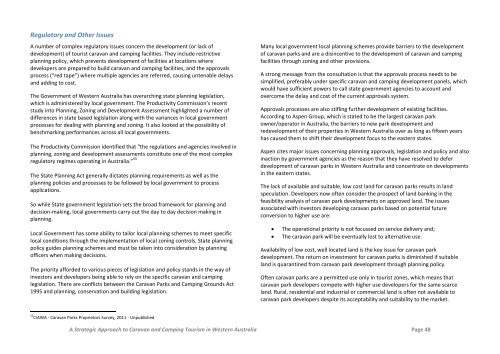

![Annual Report 2002 - 2003 [pdf ] - Tourism Western Australia](https://img.yumpu.com/27124309/1/186x260/annual-report-2002-2003-pdf-tourism-western-australia.jpg?quality=85)
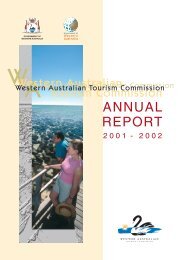

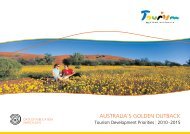
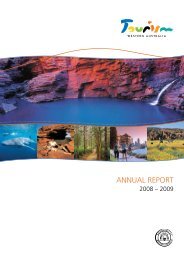

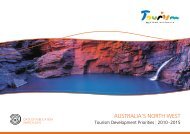
![Our Direction in China 2012 - 2015 [pdf ] - Tourism Western Australia](https://img.yumpu.com/27124271/1/184x260/our-direction-in-china-2012-2015-pdf-tourism-western-australia.jpg?quality=85)
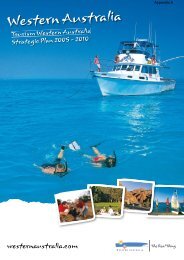

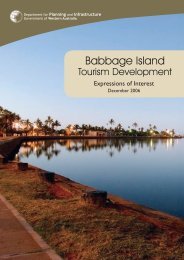
![Naturebank Program 2011 [pdf ] - Tourism Western Australia](https://img.yumpu.com/27124244/1/184x260/naturebank-program-2011-pdf-tourism-western-australia.jpg?quality=85)
